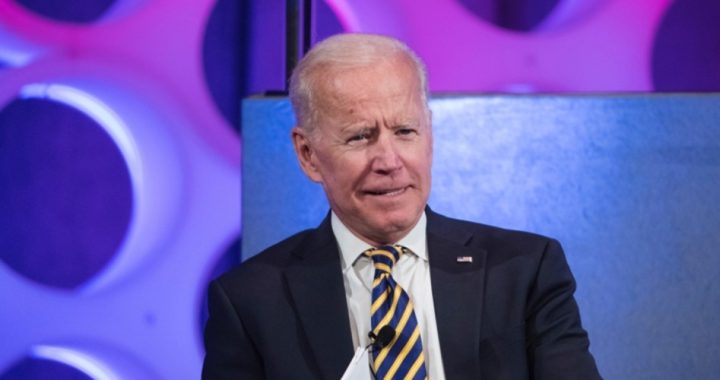
It looks like Joe Biden (shown), who earned the moniker “Creepy Joe” for making women feel uncomfortable in his presence, is in trouble again.
This time, the former vice president must explain why he opposed forced busing to his liberal constituency whose votes he’d need in order to win the Democratic presidential nomination. And he must also explain why he sought the support of senators disparaged today as “segregationists.”
CNN disentombed four letters, never before published, that show that “he followed the lead of — and sought support from — some of the Senate’s most fervent segregationists.”
On top of the revelations that women are sick and tired of his hugging, kissing, and sniffing, the news that Biden was tight as an Alabama tick with “segregationists” on the busing issue doesn’t look good, particularly to liberal members of his own party who supported the policy of busing schoolchildren out of their own neighborhoods to schools farther away as a means to desegregate the schools.
Forced Busing Bad
“Joe Biden’s road to a third presidential bid has been lined with a series of explanations and apologies,” CNN reported, “illustrating the challenges of preparing a long record of public service for fresh scrutiny under the spotlight of the 2020 campaign.”
Most of those apologies concern his creepy approach to women, “yet he rarely discusses one of the earliest — and most controversial — issues he championed in the Senate: his fight against busing to desegregate schools.”
The first of the four letters, which Biden wrote on March 25, 1977, sought support from his colleagues for the “Equal Educational Opportunities Amendments of 1977 which would amend the Educational Opportunities Act of 1974 to prohibit the courts from ordering the transportation of any student unless the court first determined that a racially discriminatory purpose was a motivating factor in the constitutional violation for which transportation is proposed as a remedy.”
The idea was this. If schools were segregated, but not for a discriminatory reason, then courts could not impose forced busing — an idea from the centralizing, totalitarian Left — to integrate the schools.
Wrote Biden, “my bill strikes at the heart of the Injustice of court-ordered busing. It prohibits the federal courts from disrupting our educational system in the name of the Constitution where there is no evidence that the government officials intended to discriminate.”
Biden wrote that he believed “there is a growing sentiment in the Congress to curb unnecessary busing. In September of 1975, the Senate passed my amendment to the new [Health, Education and Welfare] appropriations bill that prohibited HEW from ordering busing to achieve school integration. That was the first time the U.S. Senate took a firm stand in opposition to busing. The Supreme Court seems to recognize that busing simply cannot be justified in cases where state and local officials intended no discrimination.”
HEW, the Department of Health, Education and Welfare, was the predecessor agency to the Health and Human Services, the Goliath welfare agency.
Biden then sought the support of Judiciary chieftain James O. Eastland.
The conservative Mississippian was a strong proponent of keeping the races separate because “the southern institution of racial segregation or racial separation was the correct, self-evident truth which arose from the chaos and confusion of the reconstruction period,” as Eastland said on the Senate floor after the U.S. Supreme Court decided Brown v. Board of Education. “Separation promotes racial harmony,” he said, and is “desired and supported by the vast majority of the members of both races in the South, who dwell side by side under harmonious conditions.”
Unfazed by Eastland’s strong views on race, Biden wrote to the powerful committee chairman twice — June 30 and July 13, 1977 — to thank Eastland for helping “bring my anti-busing legislation to a vote.”
On August 22, 1978, Biden wrote again to seek Eastland’s help “to limit the use of busing as a remedy in school desegregation cases.” Wrote Biden, “since your support is essential to having a bill reported out by the Judiciary Committee I want to personally ask your continued support and learnt you to our intentions.”
“Joe Biden is today — and has been for more than 40 years in public life — one of the strongest and most powerful voices for civil rights in America,” a Biden underling told CNN. “His long commitment to civil rights has repeatedly been recognized by many of the most important civil rights organizations in America.”
Which says absolutely nothing about whether Biden has changed his mind on forced busing or regrets seeking Eastland’s help. Funny thing is, Biden was right to oppose forced busing, which was a bad idea regardless of the reason why the centralizers in Washington and the federal courts wanted to impose it on the parents and students who vehemently opposed it. Some black Americans opposed it as strongly as whites.
Photo of Joe Biden: AP Images



